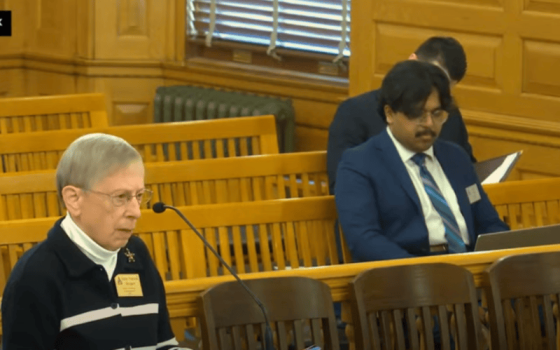"I was afraid that [the men traveling with me] would rape me, so I turned myself in."
Sofia* told me as we sat in a bus station in Nogales, Sonora, Mexico. She was in tears. She had been caught by the Border Patrol entering the United States, randomly selected to be sent to federal court through Operation Streamline, given criminal charges, and deported back to Nogales.
She told me, "I pledged guilty in court because I was guilty of what they charged: I came to Arizona without permission." Sofia knew the risks of apprehension, but she also knew the real risks that faced her in the desert. She made an impossible choice.
But that is not the complete story.
Sofia, nearly a decade ago, had left two daughters with family in Mexico so she could come to the United States to find work and support them financially. As she settled in, she married and had a son. In September, Sofia returned to Mexico to see her daughters for the first time since she had left; they had grown, graduated high school, and one had married and had begun a family of her own. Sofia had missed so many stages of their lives. She wanted to be with her children, to see the fruits of her long-distance labor.
She thought it would as easy to return to the United States as it had been when she first entered 10 years ago. She didn't know that the landscape had changed so dramatically.
She contracted with a coyote, the nefarious people smugglers who operate on the southwest border, to take her through the Arizona desert. He abandoned her with two men, with whom she would be lost in the desert for five days.
Sofia was forced to carry the men's supplies, their food and water -- 60 pounds, she says -- on her back. When she grew weary, they pulled her by the hair and forced her to keep going. They did not let her rest. Out of cruelty, they took her shoes and made her carry on through the rocky desert in only socks. She showed me bruises on her legs where they kicked her and bruised wrists where they grabbed and twisted her.
After wandering lost for days, they arrived at a highway. Sofia ran toward it, knowing that meant she would likely be seen by the U.S. Border Patrol and arrested. She turned herself in because she feared for her life at the hands of her abusive traveling companions.
When she was arrested, she told the officer what she had experienced. He told her that she had "brought it upon herself, that she was a criminal." After that, she said nothing.
A young woman, Anita*, had latched onto Sofia in Nogales and hovered nearby as she told her story. Anita told me that her husband had been murdered in Mexico and that she left her 6-month-old baby with family in order to flee from danger. Her first attempt at entering the United States had failed. She said, "One has so many illusions about what this journey will be like …"
At 20 years old, Anita faces an impossible choice. Should she save her life and maybe her child's, though it means years of separation and risking her life in the desert? Or does she return home where she may be at risk, but where she will be together with her child? Should she risk her life at home or in the desert?
Anita told me that she would return to her home.
Sofia also has impossible choices: She can avoid the dangers of the desert crossing and return to a home she left many years ago in hopes of advancing the futures of her children. Or knowing the hardships of being separated for economic reasons from her daughters, should she choose to never again live with her U.S. citizen child?
Sofia was going to try again, she said, but in a different place. She told me, "I have faith that I will be able to see my husband and son again."
As we three women sat together in the dusty bus depot, Sofia reached into her pocket and handed me a tiny statuette of St. Jude, patron saint of lost causes. She carries him close to her, as protection and blessing.
She reached again into her pocket and handed me another image of "San Judito," a gift for me, a small keychain with her blessing.
May he protect us all from lost causes, and from impossible choices.
*Names have been changed in order to protect privacy.
[Vicki Kline, a Catholic Worker and professional social worker, is currently exploring the intersection between vocation and career in the borderlands. She can be reached at victoria.kline@hotmail.com.]
 To see all of NCR's coverage of immigration, see our new blog: Immigration and the Church. To receive a weekly e-mail update with highlights from the blog, follow this link to the sign-up page. If you already receive e-mail alerts from NCR, add Immigration and the Church to your profile. To see all of NCR's coverage of immigration, see our new blog: Immigration and the Church. To receive a weekly e-mail update with highlights from the blog, follow this link to the sign-up page. If you already receive e-mail alerts from NCR, add Immigration and the Church to your profile. |



